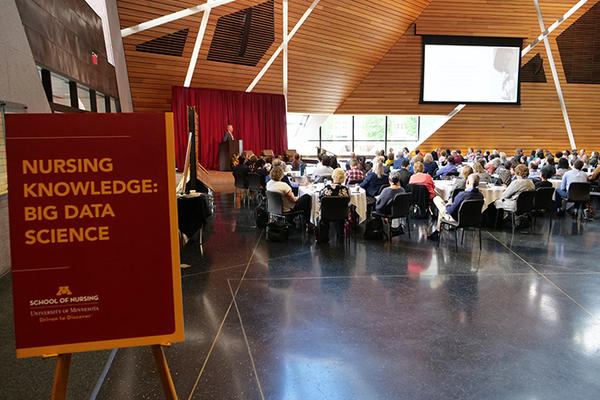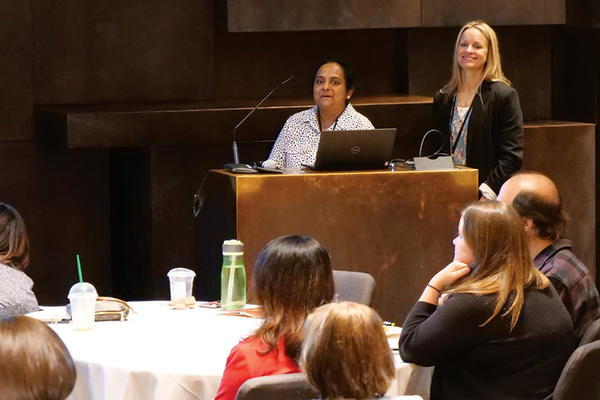University leading consortium to train underrepresented in using data to improve public health
March 1, 2022

Clinical associate professor Priya Rajamani
The University of Minnesota is leading a first-of-its-kind partnership to help underrepresented students and professional trainees harness the power of public health data to develop disease-prevention and well-being improvement initiatives in their communities.
The TRaining in Informatics for Underrepresented Minorities in Public Health (TRIUMPH) Consortium is led by the University of Minnesota’s School of Public Health and School of Nursing and includes Bethune-Cookman University, Georgia Southern University, and the University of South Florida. The five-school consortium aims to advance health equity by creating sustainable pathways to careers in public health informatics and technology for underrepresented students and individuals already in the public health workforce. TRIUMPH is funded by a four-year, $7.9 million grant from the U.S. Office of the National Coordinator for Health Information Technology (ONC) as part of its Public Health Informatics & Technology Workforce Development Program (PHIT Workforce Program).
Informatics, defined as “the science of how to use data, information and knowledge to improve human health and the delivery of healthcare services” has been identified as a critical skillset for the public health workforce.
TRIUMPH is led by School of Public Health Associate Professor Rebecca Wurtz and School of Nursing Clinical Associate Professor Priya Rajamani who are both national experts in using information technology and data to improve the health of large populations. The School of Nursing is a leader in nursing informatics and was the first school to offer a Doctor of Nursing Practice specialty in nursing informatics. It is home to the Center for Nursing Informatics and annually hosts the Nursing Knowledge: Big Data Science Conference
“COVID-19 has shown us that we don’t have easily accessible, real-time health data for people severely impacted by the pandemic,” said Wurtz. “In response, this consortium is part of a national workforce development initiative to help public health build back better to address the health challenges re-identified by the pandemic.”
"The pandemic exposed two big chasms in public health: under-resourced public health agencies that are relying on outdated technology, and a workforce not tech savvy and not representative of the population being served,” said Rajamani. “TRIUMPH hopes to address the both by providing public health informatics training and funding for underrepresented minorities.”
Over the four years of the grant, the members of the TRIUMPH consortium plan to train more than 600 students and public health professionals at universities that have historically served Black, Latinx, and Native American people.
“It’s important to start on the ground level with people who are beginning their education,” said TRIUMPH manager Yasmin Odowa. “It’s also essential to include people who have been historically underrepresented in informatics — especially in managing data — because they approach it from new, beneficial, and often overlooked perspectives.”
The consortium will teach informatics through a variety of avenues, including workshops, webinars, certificates, university courses and degrees, and stipend-supported practice opportunities. Consortium members will share curriculum, course designs, and other educational resources with one another.
Each of the five TRIUMPH Consortium member schools serve minority communities and are conducting their own regionally-relevant informatics project:
- Bethune-Cookman University
Building public health data visualization lab and developing a health informatics and health equity curriculum. - Georgia Southern University
Creating an online public health informatics MPH concentration and adding in a public health informatics course to its public health programs. - University of Minnesota School of Nursing
Creating a population health informatics certificate program. - University of Minnesota School of Public Health
Creating an informatics track open to any student, with a focus on Native American students in the Public Health Administration & Policy distance program - University of South Florida
Developing and enhancing public health informatics coursework in its College of Public Health.
The schools are also working with the following practice partners who will provide guidance and opportunities for students to use informatics on real-world projects:
- Florida Department of Health-Volusia County
- Georgia Coastal Health District
- HealthHIE Georgia
- Minnesota Department of Health
- Public Health Informatics Institute
Focus on informatics and Native American health in Minnesota
The University of Minnesota has a long and continuing history of serving minority communities in the state. To help bring the benefits of informatics to those communities, Rajamani and School of Nursing Assistant Professor and certificate faculty member Dr. Robin Austin are developing a population health certificate, with courses in the School of Nursing and School of Public Health, with the specific goal to attract minority students to the program.
“The population health informatics certificate will provide the skills necessary for students to facilitate a data-driven perspective of public health,” said Austin. Austin is the incoming director of the Center for Nursing Informatics, which is leading cutting edge research through discovery and application of informatics research methods to improve the health of individuals and communities and has a long history of providing graduate and professional development academic offerings.
The School of Public Health is focusing on providing learning opportunities on population and public health informatics easier for Native American public health students. The school is adapting its existing online Public Health Administration & Policy MPH to offer a track tailored to providing informatics education to Native American students living and working in their home communities. The track will feature placing up to four students each in “learning circles” and teaming them with a local Native American informatics or public health professional to mentor them in their education. Students will also have the opportunity to take informatics courses from other University schools and colleges.
The Minnesota Department of Health and other practice partners will provide the students from both of the University programs with hands-on applied practice experiences working on informatics projects.
Additionally, the School of Public Health is creating an optional informatics workbook for all MPH students across the consortium to complete during their required applied practice (AP) experiences. The workbook will walk students through exploring informatics and information science use at their AP sites. Students will get a $2,000 stipend for completing the work.
Rajamani and Wurtz are currently developing the curriculum and content for their programs with plans to begin offering courses and the optional workbook by Fall 2022.


